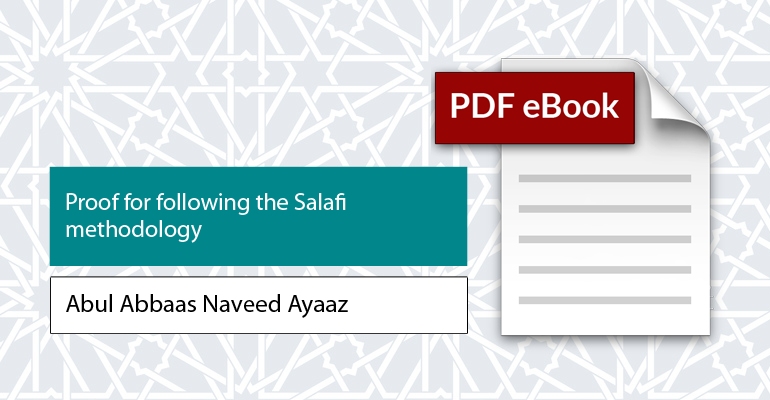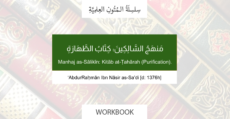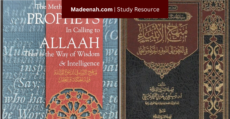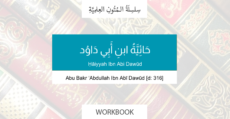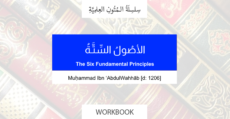 Loading…
Loading…
In the name of Allāh, the most Merciful, the Bestower of mercy.
Allāh, the Most High, sent His Messenger Muḥammad ﷺ with His Book; He remained upon the earth explaining and clarifying it through his actions and statements which is known as his Sunnah or Ḥadīth.
His Ṣaḥābah (Companions) learned, memorised, implemented and conveyed his teachings to their students – the Tābi’īn; who did so to the next generation – atbā’ Tābi’īn. These three generations are collectively known as the Salaf.
The ensuing generations of Muslims cannot correctly understand and implement the Qur’ān and Ḥadīth without knowing how the Salaf understood them. For this reason, every Muslim must be a Salafi i.e. understand the Qur’ān and Ḥadīth according to the way of the Ṣaḥābah, and implement Islām according to their methodology of implementation.
This article proves the obligation of following the way of the Salaf. Importantly, the objective behind this article is not to present an exhaustive list of proofs for following the way of the Salaf, rather this is a brief demonstration of some of the proofs.
Āyāt from the Qur’an.
{Whoever opposes the Messenger after guidance has become clear to him and follows a path different to the path of the believers – We will turn him [away to the path] he has taken…} [04:115]
Point of evidence: In this Āyah, we are forbidden from ‘opposing the Messenger’ i.e. his Sunnah, and then we are forbidden from opposing the ‘way of the believers’ i.e. the Ṣaḥābah and then those who came after them upon their way.
(So if they believe in the same as you believe in, then they have been [rightly] guided; but if they turn away, they are only in dissension, and Allāh will be sufficient for you against them. And He is the Hearing, the Knowing} [02:137]
Point of evidence: In this Āyah, the word {you} is mentioned in the plural form referring to the Prophet ﷺ and those who believed in him i.e. the Ṣaḥābah and then the ensuing generations who were upon their methodology. So Allāh, the most High, said regarding the disbelievers: {if they (i.e. the disbelievers) believe in the same as you (the believers) believe in, then they have been [rightly] guided}.
{Say, “This is my way; I invite to Allāh with insight, I and those who follow me. And exalted is Allāh; and I am not of those who associate others with Him} [12:108]
Point of evidence: In the above Āyah, Allāh ordered the Prophet ﷺ to invite mankind to his way, and this is what he and his followers are upon; his ‘followers’ are the Ṣaḥābah and then those who followed them.
{And the first early [Muslims] amongst the Muhājirīn and Anṣār, and then those who followed them upon goodness – Allāh is pleased with them and they are pleased with Him…} [9:100]
Point of evidence: In the above Āyah, Allāh praises the early and most senior Ṣaḥābah, and then praises those who follow them upon goodness. This is not mere praise, but also an encouragement for us to follow them.
{But Allāh sent down His tranquillity upon His Messenger and upon the believers and imposed upon them the word of righteousness, and they were more deserving of it and worthy of it. And ever is Allah, of all things, Knowing} [48:26]
Point of Evidence: In the above Āyah, Allāh mentions the Messenger and ‘the believers’ i.e. the Ṣaḥābah, and then by extension those who came after them following their methodology.
{For the poor Muhājirīn who were expelled from their homes and their properties, seeking bounty from Allāh and [His] approval and supporting Allāh and His Messenger, [there is also a share]. Those are the truthful} [59:08]
{And those (Anṣār) who were settled in Madinah and [adopted] Imān before them. They love those who emigrated to them and find not any want in their chests of what the emigrants were given but give [them] preference over themselves, even though they are in need. And whoever is protected from the stinginess of his soul – it is those who will be the successful} [59:08]
{And [there is a share for] those who came after them, saying, “Our Lord, forgive us and our brothers who preceded us in faith and put not in our hearts [any] resentment toward those who have believed. Our Lord, indeed You are Kind and Merciful} [59:10]
Point of evidence: In the above three Āyāt, Allāh mentions the virtues of the Muhājirīn, the Anṣār and then those who come after them from the remaining Ṣaḥābah and then the ensuing generations who follow their methodology.
Āḥādīth from the Prophet ﷺ
The Ṣaḥābah asked the Prophet ﷺ who the saved sect are, he replied: ‘They are those who are upon what I and my Ṣaḥābah are upon today.’ [at-Tirmidhī]
Point of evidence: In the above Ḥadīth, the Prophet ﷺ did not suffice in mentioning the importance of following him – i.e. his Sunnah – rather he also mentioned being upon the way of his Ṣaḥābah. Therefore the path to salvation is in following the Sunnah of the Prophet ﷺ, and the Sahābah who are the first generation of the Salaf. Those who most resemble them in their methodology are the saved sect – as mentioned in the Ḥadīth. And those who most resembled them were indeed the Tābi’īn and atbā’ Tābi’īn.
The Prophet ﷺ specified three generations of people who are the best people, he said:
‘the best people are those of my generation (i.e. Ṣaḥābah), then those who come after them (i.e. Tābi’īn), then those who come after them (i.e. Atbā’ at-Tābi’īn)…’ [Al-Bukhārī]
Point of evidence: In the above Ḥadīth, there is a direct reference to the first three generations of the Muslims – collectively known as the Salaf. The Ḥadīth is not mere praise, rather it entails following their way.
In a time in which there is much confusion, the Prophet ﷺ advised us what to refer back to.
He said, ‘Whoever amongst you lives long, will see much difference, so upon you is my Sunnah and the Sunnah of the righteous guided Caliphs. Beware of the newly-innovated matters, verily they are misguidance.’ [Abu Dawūd]
Point of evidence: He did not suffice with following his Sunnah, he also obligated following the way of the Caliphs and called their way a Sunnah. The four rightly guided Caliphs were the most senior and virtuous amongst the Salaf.
Narrations from the Salaf
Ibn Mas’ūd (radiAllāhu ‘anhu) said, ‘Follow and do not innovate, for you have been sufficed. Every innovation is misguidance.’ [Sunnan ad-Dārimi; al-Laalika’ee in Sharḥ Usūl i’tiqād ahl as-Sunnah]
The meaning of “follow” is to follow the way of the Ṣaḥābah and those upon their way.
Ibn Mas’ūd (radiAllāhu ‘anhu) said, ‘…They were the Ṣaḥābah of the Prophet ﷺ, they were the best of this ummah, the most righteous of hearts, the deepest in knowledge and the most straightforward; people whom Allah chose to accompany His Prophet ﷺ and establish His religion. So acknowledge their virtue and follow in their footsteps, and adhere as much as you can to their morals and religion, for they were following the right guidance.’ [Narrated by Ibn AbdilBarr in Jāmi’ al-‘ilm wa fadlihī]
Abul ‘Āliyah [d: 90h]: ‘Upon you is the original affair which they (i.e. those who preceded) were upon before differences occurred.’ [Mentioned by Suyūti in al-‘amr bi-ittibā’ wan-nahiy anil-ibtidā’]
Al-Awzā’ī [d: 157h] said, ‘be patient upon the Sunnah, stop at the limits of where the people stopped, say what they said, remain silent over what they remained silent over, and traverse the path of your righteous Salaf. Whatever was sufficient for them, is surely sufficient for you.’ [Narrated by Ajurrī in ash-Sharī’ah]
The meaning of “people” is the Sahabah and the remaining Salaf.
Al-Awzā’ī [d: 157h] said, ‘upon you is the path of the Salaf even if people abandon you, and beware of the opinions of people even if they beautify them by their speech, the affair will become clear whilst you remain upon the straight path.’ [Narrated by Ajurrī in ash- Sharī’ah]

